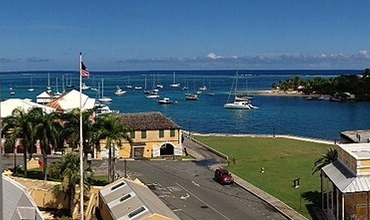Remembrance of Slave Trade and Abolition
-
 July 28, 2025
July 28, 2025The International Day of Remembrance of the Slave Trade and its Abolition is August 23rd. Parishioner Rick Fain, a member of the Anti-Racism Committee offers this reflection and call to action.
My first exposure to the slave, trade outside of something I read in a textbook, was a visceral experience I had when I visited the Slavery Memorial at the Christiansted National Historic site when I lived on the island of St. Croix in the US Virgin Islands. St. Croix was a Danish territory from 1733 to 1917 and one of the centers of slave trading in the Caribbean. There are records of more than 100,000 slaves who were brought, confined, auctioned and sold in St. Croix from 1734 to 1803. The Danish West India Company kept meticulous records of the origin, family composition and disposition of each slave who were mostly sourced from what is now modern Ghana in West Africa which was also a Danish colony.
The damp, dark dungeons where the slaves were kept were a shock to the senses. Touching the chains and cuffs that bound the slaves as they waited to be auctioned provoked raw emotion. To touch something that you know shackled another human being kept like an animal in a cage was a powerful experience which really brought home the reality of what enslaved people went through after being dragged from their homes and transported in squalid conditions to the New World. Understanding that a place called Gallows Bay, which is now a commercial center was in fact the place where unruly slaves were publicly executed for all to see, evoked waves of emotion that I am feeling again as I write this narrative.
For most, we read about the horrors of slavery in textbooks in school and read about famous brave individuals who fought back against their captors. Experiencing a memorial like this in person brought to life a greater realization of what all of this meant for enslaved people.
The International Day for the Remembrance of the Slave Trade and Its Abolition is observed annually on August 23. Established by UNESCO in 1998, this day honors the memory of the millions of men, women and children who were victims of the transatlantic slave trade and celebrates those who resisted and fought for freedom. The date commemorates the 1791 uprising in Santo Domingo, Dominican Republic, a pivotal event that led to the eventual abolition of slavery in the region and inspired liberation movements across the world.
UNESCO encourages reflection on the causes, consequences and lessons of this tragic history through education and dialogue. It emphasizes the importance of teaching this history not only to honor the victims but also to understand the roots of modern racism, discrimination and inequality. As Christians, we reflect on these divisions in our society and in fact to some degree we experience a type of slavery in our own time with migrant workers sequestered in jobs that no one else will take, in meat processing plants and sweltering fields in squalid conditions.
Let us hope that these types of commemorative events will provide an opportunity to highlight the contemporary forms of slavery and human trafficking that still exist, reminding us that the struggle for freedom and dignity is ongoing. By confronting this painful past and honoring the legacies of those who resisted, we reaffirm our collective responsibility as Catholics, to oppose all forms of modern-day slavery and injustice.
Rick Fain, parishioner and member of the Anti-Racism Committee
